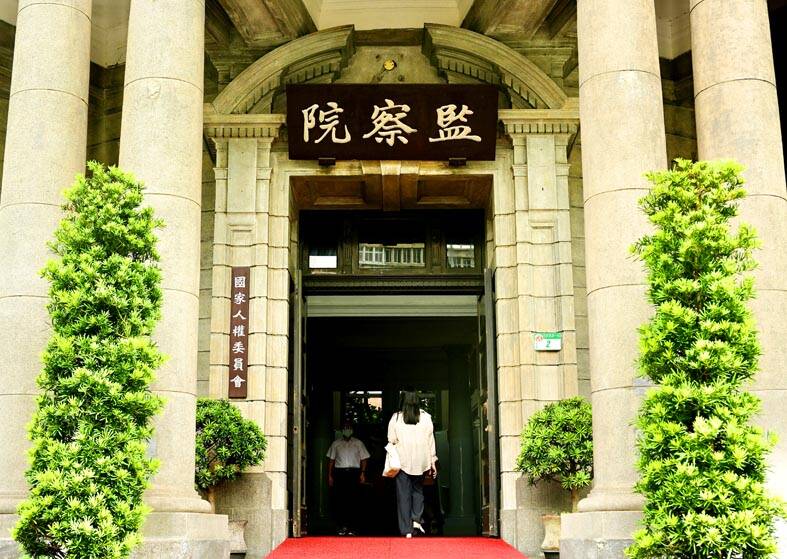The Control Yuan on Monday asked the Constitutional Court to rule on the constitutionality of legislative amendments passed in May, saying that they allow the Legislative Yuan to usurp its power.
The petition was filed by Yang Chang-hsien (楊昌憲), head of the Control Yuan’s Department of Supervisory Investigation, and attorney Lee Yuan-te (李元德) on behalf of the government watchdog at the Judicial Yuan in Taipei on Monday afternoon.
They also filed an application for an injunction to halt enforcement of the revisions to the Act Governing the Legislative Yuan’s Power (立法院職權行使法) and the Criminal Code that were signed into law by President William Lai (賴清德) last week.

Photo: Hsieh Chun-lin, Taipei Times
The Control Yuan is the latest entity to challenge the amendments at the Constitutional Court, following the Cabinet, Lai and the Democratic Progressive Party (DPP) caucus.
The court has agreed to review the DPP’s petition on the constitutionality of the amendments and its application for an injunction.
It is not yet clear whether it would make the same decision on the other petitions and applications, or whether it would merge the separate filings.
A spokesperson for the Judicial Yuan, which oversees the Constitutional Court, said that the court should consolidate multiple petitions on the same legal disputes, but the justices have yet to determine whether the disputes are of the same nature.
The Control Yuan said that the amendments, which took effect on Thursday last week, undermined its investigative powers accorded in articles 95 and 96 of the Constitution.
The revisions give the legislature new investigative powers, including the power to hold hearings, while public officials are subject to fines and jail time if they refuse to attend hearings or provide information, or if they are deemed to have presented false information.
In the case of individuals or groups from the private sector, they would face penalties if they are deemed uncooperative.
The measures fail to make a clear distinction between the investigatory powers of the Control Yuan and those of the Legislative Yuan, Control Yuan Secretary-General Lee Chun-yi (李俊俋) said.
At a news conference on Wednesday last week, Lee cited the Constitutional Court’s Interpretation No. 585 — its 2004 judgement on the scope of legislative authority — which says that the legislature’s investigative powers should “not grow unchecked” under “the principles of separation of powers, and checks and balances.”
Chinese Nationalist Party (KMT) and Taiwan People’s Party lawmakers, who pushed the amendments through on May 28, said that the revisions were necessary to check the power of the government.
That was especially true given allegations of corruption and wrongdoing relating to several major DPP government policies and investment projects that the government has never had to answer for, they said.
The Control Yuan is a branch of government dedicated to investigating improper or illegal behavior by government agencies, government officials and civil servants.

Taiwan has received more than US$70 million in royalties as of the end of last year from developing the F-16V jet as countries worldwide purchase or upgrade to this popular model, government and military officials said on Saturday. Taiwan funded the development of the F-16V jet and ended up the sole investor as other countries withdrew from the program. Now the F-16V is increasingly popular and countries must pay Taiwan a percentage in royalties when they purchase new F-16V aircraft or upgrade older F-16 models. The next five years are expected to be the peak for these royalties, with Taiwan potentially earning

STAY IN YOUR LANE: As the US and Israel attack Iran, the ministry has warned China not to overstep by including Taiwanese citizens in its evacuation orders The Ministry of Foreign Affairs (MOFA) yesterday rebuked a statement by China’s embassy in Israel that it would evacuate Taiwanese holders of Chinese travel documents from Israel amid the latter’s escalating conflict with Iran. Tensions have risen across the Middle East in the wake of US and Israeli airstrikes on Iran beginning Saturday. China subsequently issued an evacuation notice for its citizens. In a news release, the Chinese embassy in Israel said holders of “Taiwan compatriot permits (台胞證)” issued to Taiwanese nationals by Chinese authorities for travel to China — could register for evacuation to Egypt. In Taipei, the ministry yesterday said Taiwan

Taiwan is awaiting official notification from the US regarding the status of the Agreement on Reciprocal Trade (ART) after the US Supreme Court ruled US President Donald Trump's global tariffs unconstitutional. Speaking to reporters before a legislative hearing today, Premier Cho Jung-tai (卓榮泰) said that Taiwan's negotiation team remains focused on ensuring that the bilateral trade deal remains intact despite the legal challenge to Trump's tariff policy. "The US has pledged to notify its trade partners once the subsequent administrative and legal processes are finalized, and that certainly includes Taiwan," Cho said when asked about opposition parties’ doubts that the ART was

If China chose to invade Taiwan tomorrow, it would only have to sever three undersea fiber-optic cable clusters to cause a data blackout, Jason Hsu (許毓仁), a senior fellow at the Hudson Institute and former Chinese Nationalist Party (KMT) legislator, told a US security panel yesterday. In a Taiwan contingency, cable disruption would be one of the earliest preinvasion actions and the signal that escalation had begun, he said, adding that Taiwan’s current cable repair capabilities are insufficient. The US-China Economic and Security Review Commission (USCC) yesterday held a hearing on US-China Competition Under the Sea, with Hsu speaking on